Non-Returning Students
Retention & SuccessThe Non-Returning Student Experience
Why Students Leave College Early
A non-returning student is a student who chooses not to re-enroll for another semester, despite not graduating and/or transferring. Many non-returning students make substantial progress toward their academic goals while enrolled, but leave college short of achieving them. There are many reasons why students choose to leave college early. Some students may struggle to balance educational pursuits with family responsibilities, employment, and/or health issues. Other students may wonder how they can continue to finance their education, or they may find the registration process to be too confusing or difficult.
Each semester, hundreds of students make the decision to discontinue their enrollment at NOVA. While some of these students may return to NOVA or enroll at another institution in the future, many will not return to college at all. To better understand the reasons why some NOVA students have chosen not to return to campus, the College surveyed a population of recent nonreturning students. The survey asked students why they chose to leave NOVA and what obstacles they encountered that prevented them from reenrolling. Addressing the challenges identified by these students will be critical to NOVA’s efforts to improve the retention, persistence, and long-term success of all students who step foot on campus.
Nationwide NUMBERS



81%
Fall-to-fall retention rate of first-time, full-time students at public, four-year institutions.1
62%
Fall-to-fall retention rate of first-time, full-time students at public, two-year institutions.1
1-in-5
students who left college without a degree completed 75 percent or more of the credits needed to graduate.2

34%
of surveyed community college students said their employment was an obstacle to their success.3

19%
of surveyed community college students said paying for tuition was an obstacle to their success.3
Nationwide NUMBERS


81%
Fall-to-fall retention rate of first-time, full-time students at public, four-year institutions.1
62%
Fall-to-fall retention rate of first-time, full-time students at public, two-year institutions.1

1-in-5
students who left college without a degree completed 75 percent or more of the credits needed to graduate.2

34%
of surveyed community college students said their employment was an obstacle to their success.3

19%
of surveyed community college students said paying for tuition was an obstacle to their success.3
Nationwide NUMBERS

81%
Fall-to-fall retention rate of first-time, full-time students at public, four-year institutions.1

62%
Fall-to-fall retention rate of first-time, full-time students at public, two-year institutions.1

1-in-5
students who left college without a degree completed 75 percent or more of the credits needed to graduate.2

34%
of surveyed community college students said their employment was an obstacle to their success.3

19%
of surveyed community college students said paying for tuition was an obstacle to their success.3
SUCCESS RATES AT COMMUNITY COLLEGE

SUCCESS RATES AT COMMUNITY COLLEGE
NOVA SURVEY OF NON-RETURNING STUDENTS
Personal

42%
Family responsibilities

36%
Busy work schedule

22%
Health issues
Financial

60%
Could not afford tuition

38%
Issues attaining financial aid

37%
Unexpected financial obligations
Institutional

40%
College procedures/policies prevented registration

36%
Dissatisfied with the facilities

26%
Dissatisfied with course selection
Academic

55%
Dissatisfied with academic performance

45%
Dissatisfied with instructors

43%
Dissatisfied with academic advising/counseling
NOVA SURVEY OF NON-RETURNING STUDENTS
Personal

42%
Family responsibilities

36%
Busy work schedule

22%
Health issues
Financial

60%
Could not afford tuition

38%
Issues attaining financial aid

37%
Unexpected financial obligations
Institutional

40%
College procedures/policies prevented registration

36%
Dissatisfied with the facilities

26%
Dissatisfied with course selection
Academic

55%
Dissatisfied with academic performance

45%
Dissatisfied with instructors

43%
Dissatisfied with academic advising/counseling
NOVA SURVEY OF NON-RETURNING STUDENTS
Personal

42%
Family responsibilities

36%
Busy work schedule

22%
Health issues
Financial

60%
Could not afford tuition

38%
Issues attaining financial aid

37%
Unexpected financial obligations
Institutional

40%
College procedures/policies prevented registration

36%
Dissatisfied with the facilities

26%
Dissatisfied with course selection
Academic

55%
Dissatisfied with academic performance

45%
Dissatisfied with instructors

43%
Dissatisfied with academic advising/counseling
THE NOVA NON-RETURNING STUDENT EXPERIENCE


“Online courses do not work for everyone, so evening courses or possible weekend courses should be an option.”
“I wish the class registration process was easier to navigate.”


“My issue is that I make too much money in my day job to get financial aid, but not enough to pay for college.”
“As a first generation college student, I needed more guidance than what was provided.”

“[There is] limited availability of the courses I need to obtain the certificate I want.”
THE NOVA NON-RETURNING STUDENT EXPERIENCE


“Online courses do not work for everyone, so evening courses or possible weekend courses should be an option.”
“I wish the class registration process was easier to navigate.”


“My issue is that I make too much money in my day job to get financial aid, but not enough to pay for college.”
“As a first generation college student, I needed more guidance than what was provided.”

“[There is] limited availability of the courses I need to obtain the certificate I want.”
THE NOVA NON-RETURNING STUDENT EXPERIENCE

“Online courses do not work for everyone, so evening courses or possible weekend courses should be an option.”

“I wish the class registration process was easier to navigate.”

“My issue is that I make too much money in my day job to get financial aid, but not enough to pay for college.”

“As a first generation college student, I needed more guidance than what was provided.”

“[There is] limited availability of the courses I need to obtain the certificate I want.”
Learn More
Resources for Students, Faculty, and Staff
Students choose to enroll at community colleges in order to pursue a wide variety of personal and academic goals. However, due to the significant investment of time and effort required to attend college, many students will stop out or drop out before they reach their academic goals. Many obstacles can lead students to discontinue their enrollment, including personal, financial, institutional, and academic reasons.
NOVA offers a variety of support services to help students overcome the multitude of challenges they may face that could delay their path toward completion.

FINANCIAL CHALLENGES
Learn more about financial aid and how to apply at: http://www.nvcc.edu/financialaid/index.html

ACADEMIC CHALLENGES
Learn more or speak with a virtual counselor at: http://www.nvcc.edu/advising/index.html

Personal Challenges
Learn more and find available resources at: https://www.nvcc.edu/novacares/resources.html

Emergency Challenges
Find the application and more information about eligibility at: https://blogs.nvcc.edu/wssn/student-emergency-grant
Citations
- (2018). Undergraduate Retention and Graduation Rates: 2015 to 2016. National
Center for Education Statistics, U.S. Department of Education. - (2018). Community Insights: Emerging Benchmarks and Student Success Trends
from Across The Citivas. Citivas Learning. - Porter, Stephen R. and Umbach, Paul D. (2019). What Challenges to Success Do
Community College Students Face? Revealing Institutional Strengths and
Challenges (RISC), Percontor, LLC.
- Juszkiewicz, Jolanta. (2017). Trends in Community College Enrollment and
Completion Data, 2017. American Association of Community Colleges. - NOVA Office of Institutional Effectiveness and Student Success.
- (2018). NOVA Survey of Non-Returning Students, Fall 2018. NOVA Office of
Institutional Effectiveness and Student Success.
- (2018). Undergraduate Retention and Graduation Rates: 2015 to 2016. National
Center for Education Statistics, U.S. Department of Education. - (2018). Community Insights: Emerging Benchmarks and Student Success Trends
from Across The Citivas. Citivas Learning. - Porter, Stephen R. and Umbach, Paul D. (2019). What Challenges to Success Do
Community College Students Face? Revealing Institutional Strengths and
Challenges (RISC), Percontor, LLC. - Juszkiewicz, Jolanta. (2017). Trends in Community College Enrollment and
Completion Data, 2017. American Association of Community Colleges. - NOVA Office of Institutional Effectiveness and Student Success.
- (2018). NOVA Survey of Non-Returning Students, Fall 2018. NOVA Office of
Institutional Effectiveness and Student Success.
Learn More
Resources for Students, Faculty, and Staff
Students choose to enroll at community colleges in order to pursue a wide variety of personal and academic goals. However, due to the significant investment of time and effort required to attend college, many students will stop out or drop out before they reach their academic goals. Many obstacles can lead students to discontinue their enrollment, including personal, financial, institutional, and academic reasons.
NOVA offers a variety of support services to help students overcome the multitude of challenges they may face that could delay their path toward completion.

FINANCIAL CHALLENGES
Learn more about financial aid and how to apply at: http://www.nvcc.edu/financialaid/index.html

Academic Challenges
Learn more or speak with a virtual counselor at: http://www.nvcc.edu/advising/index.html

Personal Challenges
Learn more and find available resources at: https://www.nvcc.edu/novacares/resources.html

Emergency Challenges
Find the application and more information about eligibility at: https://blogs.nvcc.edu/wssn/student-emergency-grant
Citations
- (2018). Undergraduate Retention and Graduation Rates: 2015 to 2016. National
Center for Education Statistics, U.S. Department of Education. - (2018). Community Insights: Emerging Benchmarks and Student Success Trends from Across The Citivas. Citivas Learning.
- Porter, Stephen R. and Umbach, Paul D. (2019). What Challenges to Success Do
Community College Students Face? Revealing Institutional Strengths and Challenges (RISC), Percontor, LLC. - Juszkiewicz, Jolanta. (2017). Trends in Community College Enrollment and Completion Data, 2017. American Association of Community Colleges.
- NOVA Office of Institutional Effectiveness and Student Success.
- (2018). NOVA Survey of Non-Returning Students, Fall 2018. NOVA Office of
Institutional Effectiveness and Student Success.














